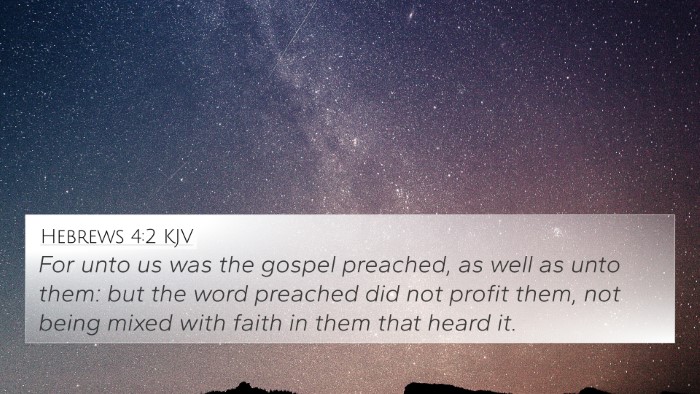Bible Verse Meaning: Mark 6:5
Mark 6:5 (KJV): "And he could there do no mighty work, save that he laid his hands upon a few sick folk and healed them."
Understanding Mark 6:5
This verse encapsulates a significant moment in the Gospel of Mark where Jesus, having returned to his hometown of Nazareth, faces skepticism from the very people who knew him as a child. The commentary insights from notable scholars offer deep reflections on this passage:
Matthew Henry's Commentary
Scope of Jesus' Ministry: Matthew Henry emphasizes that the lack of miraculous works in Nazareth highlights the importance of faith in receiving God's blessings. Jesus, while having the power to heal and perform miracles, chose to refrain from doing so in a place where there was a lack of belief. This teaches the profound principle that faith is essential for the manifestation of God's power.
Skepticism of the People: Henry notes that the people of Nazareth were not only familiar with Jesus but also took offense at his ability to heal and teach. Their doubt in his divine authority limited their experience of his mighty works.
Albert Barnes' Commentary
Jesus' Limited Miracles: Barnes discusses the phrase "could there do no mighty work," interpreting it as a reflection of the conditions dictated by human faith. Jesus’ inability to perform significant works in Nazareth was due to their unbelief, not a limitation of His power. This also underscores how unbelief can restrict the flow of blessings in our lives.
The Role of Faith: Barnes correlates this event with the notion that faith allows divine action. Although he healed a few sick, it serves as a reminder that the level of belief can affect the extent of God's work among people.
Adam Clarke's Commentary
Effects of Disbelief: Clarke comments on the psychological and social dynamics at play. The people in Nazareth likely dismissed Jesus because they could not reconcile his miraculous works with their memories of him growing up. Clarke highlights that familiarity can breed contempt, which ultimately hampers faith.
Encouragement to Seek Faith: Clarke encourages believers to cultivate faith, warning that where faith is absent, even the most powerful ministries can face limitation. This serves as a crucial lesson for modern believers who may find themselves in similar situations of doubt.
Cross-References for Mark 6:5
- Matthew 13:58: A parallel account notes Jesus did not perform many miracles due to the people's unbelief.
- Luke 4:24: Jesus states that a prophet is not accepted in his own country, relating to the theme of rejection.
- John 7:5: Highlights familial skepticism regarding Jesus' ministry.
- Hebrews 11:6: Discusses the necessity of faith in pleasing God and experiencing Him.
- James 1:6: Emphasizes the importance of doubting not when asking God for wisdom.
- Mark 9:23: Reflects the idea that all things are possible to those who believe.
- Romans 10:17: Faith comes by hearing, thus reinforcing the importance of belief in receiving God’s works.
Thematic Connections
This verse is rich with theological themes and can be connected to various scripture lessons. Here’s a more detailed thematic exploration:
-
Faith vs. Unbelief: The contrast between faith and unbelief is a predominant theme, common in many biblical narratives. This relationship shapes the environment for miracles and influences the actions of God among His people.
-
Rejection of Prophets: Mark 6:5 ties into the broader scriptural theme of how prophets and God's messengers face rejection, mirroring the sentiments found in Isaiah 53:3 and Luke 10:16.
-
The Nature of Jesus’ Authority: The authority of Jesus is continually tested by skepticism throughout the Gospels, appearing in passages like John 10:30-33 and Matthew 21:23-27.
-
Miracles and Their Conditions: The conditions under which miracles occur often hinge on belief, as seen in contexts where healing is presented, such as in Matthew 9:22 with the woman with the issue of blood.
Application to Modern Believers
Mark 6:5 serves as a reminder to contemporary believers about the importance of faith and openness in experiencing God’s miracles. It highlights how skepticism can hinder the work of God, both in personal lives and within communities. Believers are encouraged to explore the depths of scripture through tools for Bible cross-referencing, engaging in cross-reference Bible studies, and utilizing comprehensive Bible concordance resources.
Utilizing cross-referencing Biblical texts can greatly enhance understanding of passages like Mark 6:5, helping to identify links between related scriptures. Such practices can reveal profound insights into the themes of faith, authority, and the human condition, making the scripture alive and applicable.
Conclusion
In summarizing Mark 6:5, it is clear that Jesus' experience in Nazareth encapsulates the vital link between faith and divine action. By understanding the interplay of skepticism and belief illustrated through public domain commentaries, believers can gain deeper insights into not only this passage but also how it relates to the broader narrative of the scriptures. Engaging with the surrounding Bible verses enhances our understanding of God's intentions and actions, fostering a richer study experience through thematic Bible verse connections and scriptural cross-referencing.









